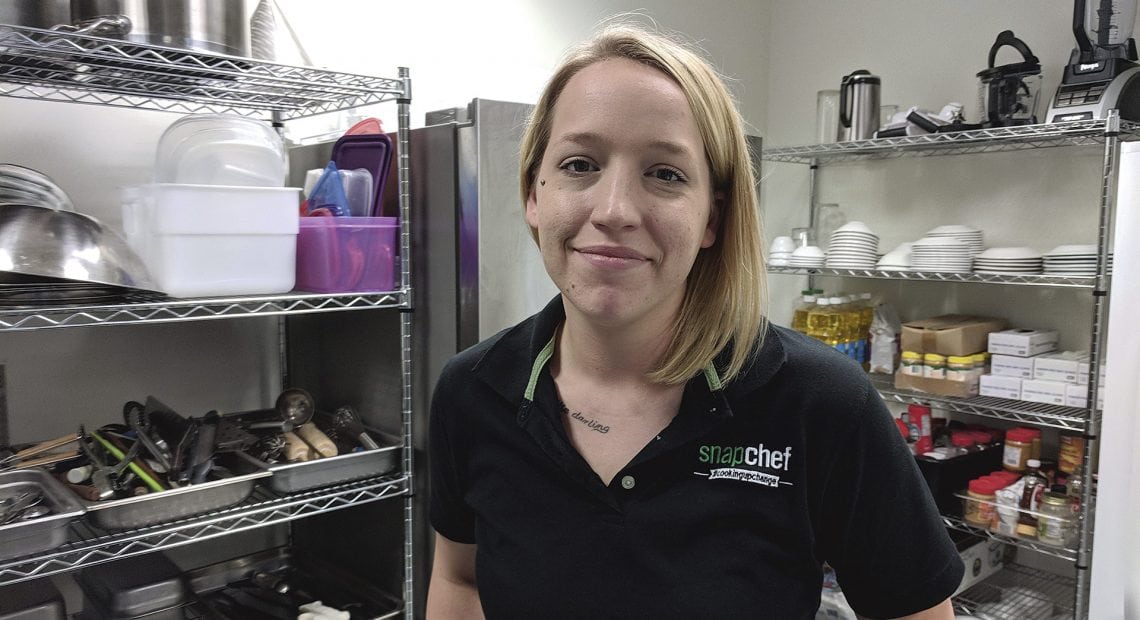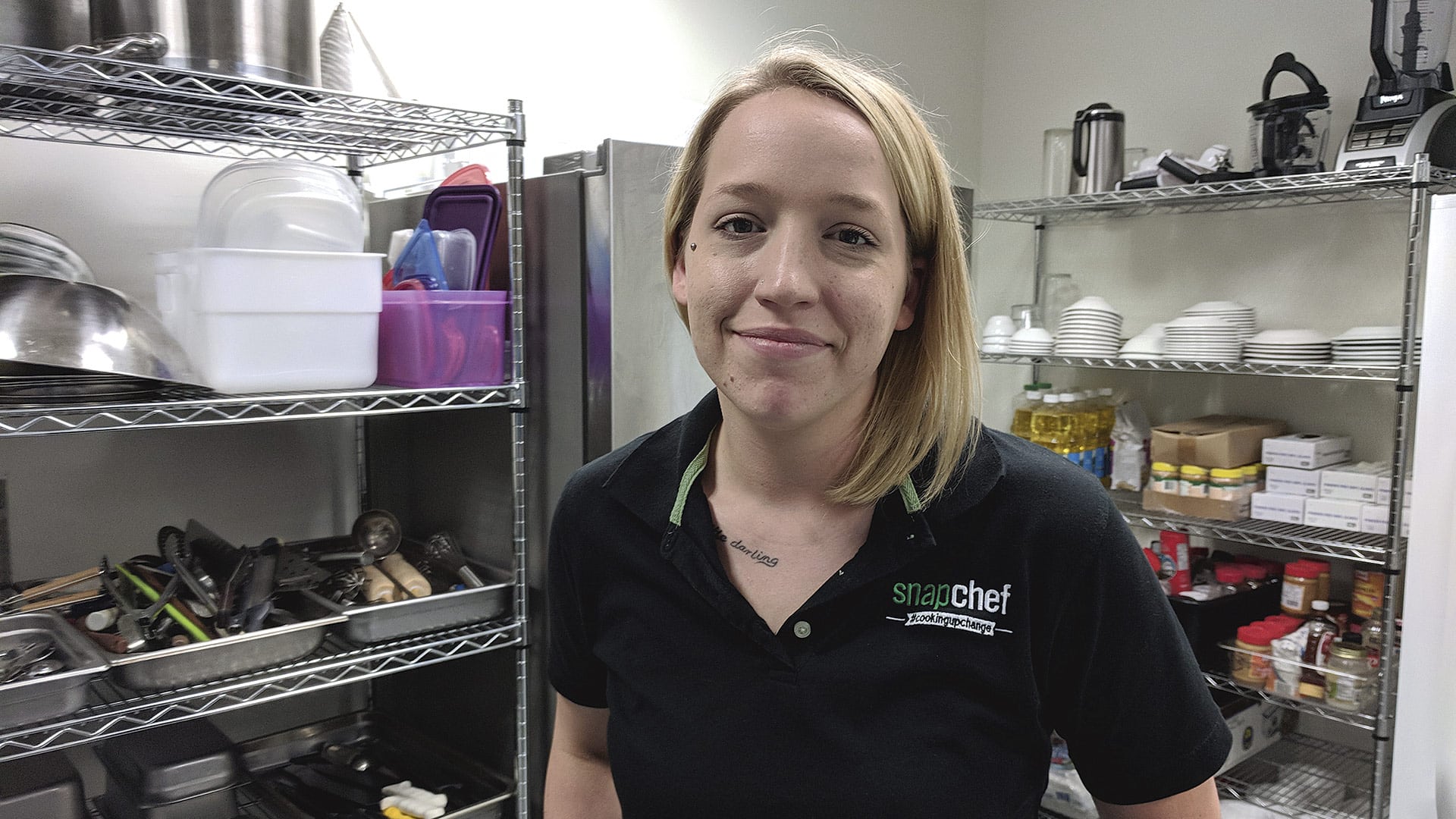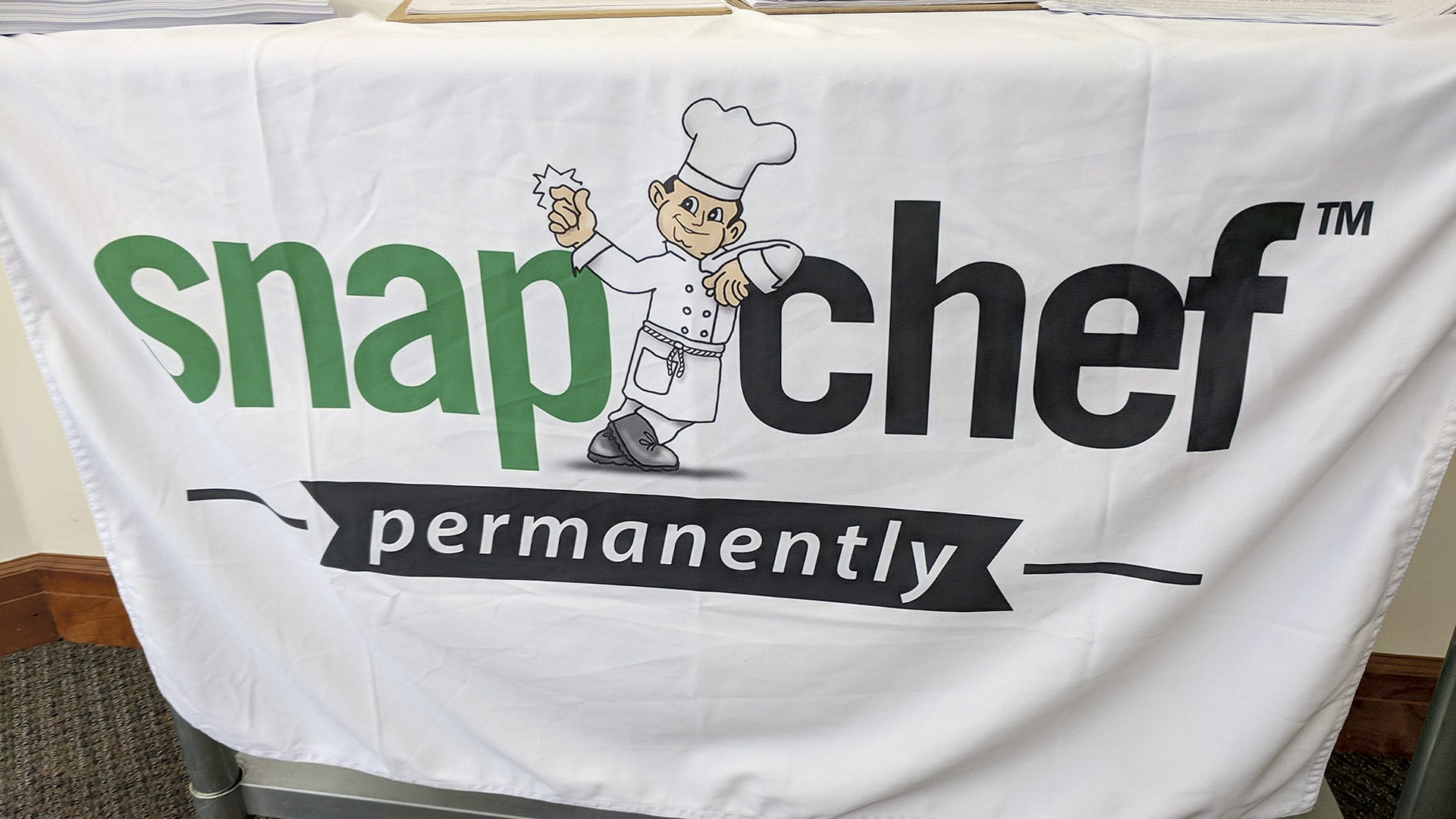
Snapchef Cooks Up a Lifeline for the Food-service Industry
The Heat Is On

Springfield Operations Manager Meagan Greene
The culinary world is a notoriously challenging place to forge a career, and turnover at the entry level is often high, a problem that constantly challenges restaurants, hotels, colleges, and a host of other food-service companies. Enter Snapchef, which has built a regional reputation for training those workers and matching them with workforce needs to help them get a foot in the door — and then, hopefully, kick it in.
It’s called ‘backfilling.’
That’s a concept businesses in many area industries — from financial services to marketing, from security to hospitality — have been thinking about as MGM Springfield has ramped up its efforts to hire some 3,000 people for its August opening.
Backfilling, simply put, it’s the replacement of an employee who moves on to a different opportunity, and MGM has undoubtedly caused a wave of that phenomenon locally. Because of the casino’s food-service operations, area restaurants, hotels, and other facilities that prepare and serve food have been doing quite a bit of backfilling as well.
If they can find adequate replacements, that is. That’s where Snapchef, a regional food-service training company that opened up shop in Springfield last year, can play a key role.
CEO Todd Snopkowski, who founded Snapchef 16 years ago, said the business model has proven successful in its other four locations — Boston, Dorchester, Worcester, and Providence, R.I. — and has found fertile ground in the City of Homes, where the need for restaurant workers has been on the rise.
“We train folks that are looking to make a career change,” he told BusinessWest. “And, being a staffing company, we don’t only train, we also match folks looking for work in the industry with jobs that are available. If they don’t have the skills to do a job, we actually train them, whether it be dishwashing, cooking, cheffing, you name it. We cover those bases and give them a foothold in the industry.”
As the largest culinary training and staffing company in New England, Snapchef essentially trains and provides staffing help to area food-service establishments. Clients range from large colleges and universities and hospitals to food-service corporations; from hotels and corporate cafeterias to hotels and restaurants.
“We train folks that are looking to make a career change,” he told BusinessWest. “And, being a staffing company, we don’t only train, we also match folks looking for work in the industry with jobs that are available. If they don’t have the skills to do a job, we actually train them, whether it be dishwashing, cooking, cheffing, you name it. We cover those bases and give them a foothold in the industry.”
“If they come to me with little or no skills or just want to brush up, we guide individuals in that track,” said Meagan Greene, operations manager in Springfield, noting that Snapchef’s 13-week courses include fast-track culinary training, ServSafe food handling, and workplace safety, among other offerings.
“When the finish the apprentice program, we try to find them full-time jobs, where they can utilize their skills in the workforce,” she went on, noting that all of that is free. The training programs are grant-funded, while Snapchef’s partner employers pay for the hours the employee works, while SnapChef pays the employee directly, with pay depending on the position.
This isn’t culinary school, Greene stressed, but a place to learn enough to get into the culinary world, and advance career-wise from there — an idea Greene called “earning and learning.”
“We go over soups, stocks, sauces, emulsions, salad bar, deli prep. Sometimes, people will go out into the field, come back, and say, ‘hey, Meagan, I did this today at work; is there a better way to do it?’ We also do a little bit of baking, which isn’t our specialty, but you’ll learn how to make pies, quick breads, muffins, and danishes.”
The need for culinary workers, especially at the entry level, is constant, Greene noted, sometimes year-round and sometimes seasonally — for example, colleges need help between September and May, while Six Flags requires a wave of help between April and October.
“For some of the colleges, this will be their second school year with us, so they may buy out some of our employees because they liked them last year,” she told BusinessWest. “It’s kind of bittersweet for us, because the people who get bought out or move forward or find their own job — those are your keepers. Those are the ones who show up for work every day, people who are clean and on time and ready to rock. I’m like, ‘noooo!’ But it’s nice to see somebody move forward.”
Moving forward, after all, is what it’s all about once that foot is in the door.
Slow Burn
Snopkowski has grown Snapchef from its original home Dorchester into a regional force that has trained thousands of workers for potentially rewarding careers in what is, admittedly, a tough field to master, and one where good help is valuable.
Clients have ranged from individual restaurants and caterers to Foxwoods Resort Casino and Gillette Stadium, as well as large food-service corporations like Aramark, Sodexo, and the Compass Group.

Snapchef CEO Todd Snopkowski
Snapchef’s growth has led to a number of accolades for Snopkowski, including the 2015 SBA Small Business Person of the Year award for Massachusetts, and the 2016 Citizens Bank Good Citizens Award. And it has inspired people like Greene, who see the value in training the next generation of food-service workers.
She works with the state Department of Labor and the Regional Employment Board of Hampden County to create apprenticeship models, teaching participants everything from basic knife skills to how to conduct themselves in a kitchen. She also helps them append their résumés based on what they’ve learned.
After studying culinary arts at a vocational high school and earning three degrees from Johnson & Wales University, she became a sous chef at Sturbridge Host Hotel, not far from her home in Warren. She loved the job — and the commute — but traded it in for an opportunity to work for Snapchef.
“To be honest, I’m never bored. I’m always doing something different,” she said, and that’s true of many of her trainees, who typically begin with temporary placements, which often become permanent. But not all are seeking a permanent gig, she added; some love the variety of ever-changing assignments.
“Some people love it because it’s a lifestyle for them,” she said. “They want to work over here, then they come back to me and say, ‘hey, Meagan, I wasn’t really liking that spot; I don’t want to go back there. I didn’t like the size of the kitchen. It was too big for me; I’m used to working in a smaller kitchen.’” I’ll say, ‘OK, I’ll try not to send you back there.’ And it’s a two-way street; clients can say, ‘I don’t want Joe Smith back.’”

Because the training is free, Snapchef offers an attractive opportunity for people who want to get a food in the door in food service.
Finishing Touches
As a company that fills a needed gap — as culinary schools aren’t typically training for entry-level positions — Snopkowski said Snapchef has made significant inroads in Western Mass. over the past year, especially working with FutureWorks Career Center to identify individuals looking to shift into the world of food service.
“Our employees don’t have to pay for transition training and all those attributes that are needed to get a foothold in the business,” he told BusinessWest. “It’s good to see that MGM recognizes it, the colleges as well.”
Speaking of financial perks, Snapchef-trained employees may access round-trip transportation from the Springfield office to their job sites across the region, for only $3 per day, Greene said. “It’s cheaper than Uber, cheaper than Lyft, and better than having your mom come pick you up and drop you off. If you live in the city and are used to taking the bus everywhere, you don’t have to worry about how to get to work.”
As for Greene, she continues to enjoy the variety of her work — a pickling enthusiast, she taught a recent class how to pickle vegetables, and they prepared 300 jars worth — as well as the success stories that arise from it, like a man trained by Snapchef who went on to further his education at Holyoke Community College and is now opening a restaurant with his daughter.
“I’ve had the opportunity to see people progress in a short period of time,” she said. “It’s nice to see someone grow so fast. I love that.”
Snopkowski has seen plenty such stories unfold in the 16 years his company has been training people for a new, challenging career, and then helping them build a foothold in the industry.
“We’ve only been able to scratch the surface; there are so many other opportunities out there,” he said. “The future is bright in culinary.”
Joseph Bednar can be reached at [email protected]




